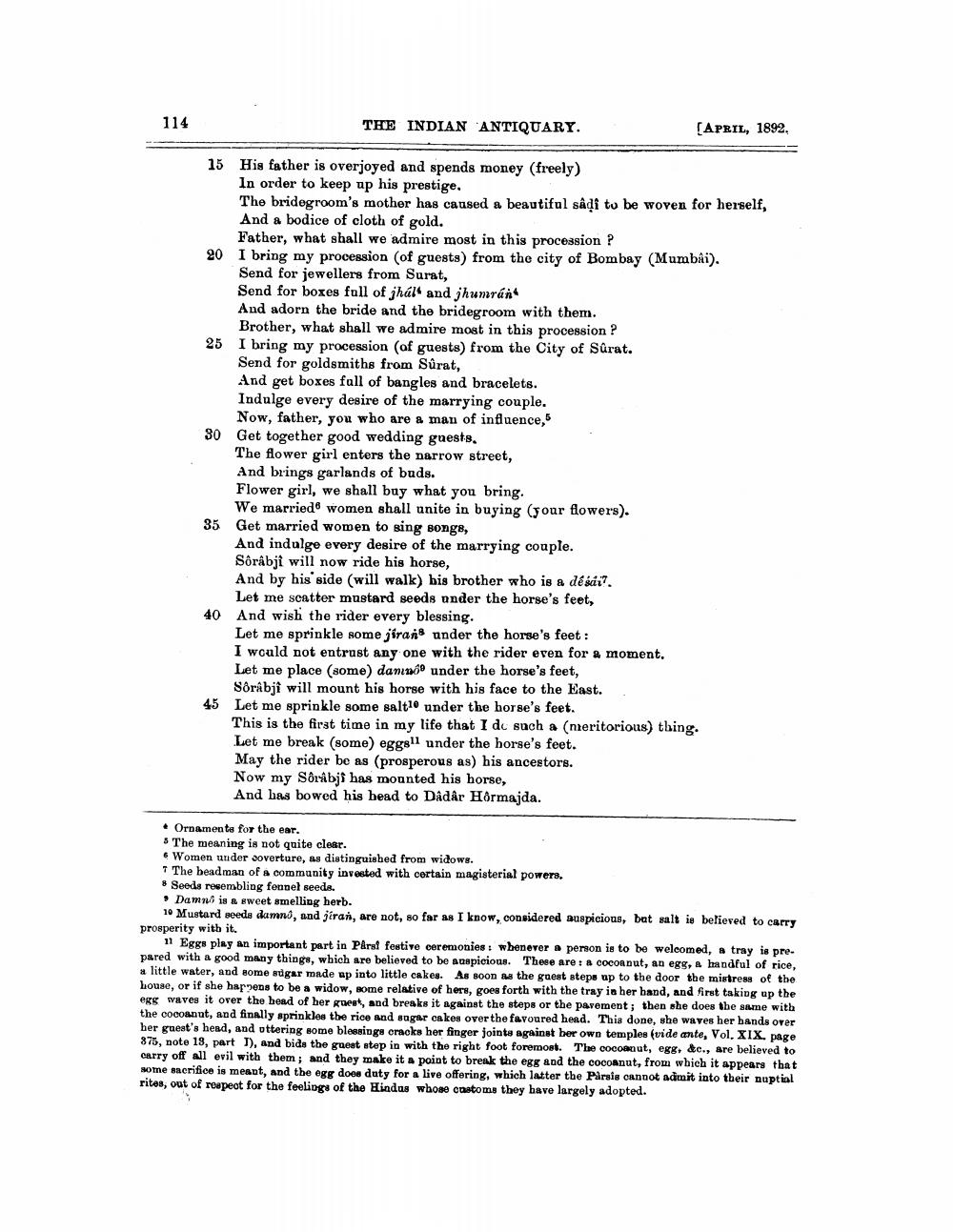________________
114
THE INDIAN ANTIQUARY.
[APRIL, 1892,
15 His father is overjoyed and spends money (freely)
In order to keep up his prestige. The bridegroom's mother has caused a beautiful sâdi to be woven for herself, And a bodice of cloth of gold.
Father, what shall we admire most in this procession ? 20 I bring my procession (of guests) from the city of Bombay (Mumbai).
Send for jewellers from Surat, Send for boxes full of jhál' and jhumrán And adorn the bride and the bridegroom with them.
Brother, what shall we admire most in this procession ? 25 I bring my procession (of guests) from the City of Sürat.
Send for goldsmiths from Sürat, And get boxes fall of bangles and bracelets. Indulge every desire of the marrying couple.
Now, father, you who are a man of influence, 30 Get together good wedding guests.
The flower girl enters the narrow street, And brings garlands of buds. Flower girl, we shall buy what you bring.
We married women shall unite in buying (your flowers). 35 Get married women to sing songs,
And indulge every desire of the marrying couple. Sôrâbji will now ride his horse, And by his side (will walk) bis brother who is a dé síi?.
Let me scatter mustard seeds under the horse's feet, 40 And wish the rider every blessing.
Let me sprinkle some jiran under the horse's feet: I would not entrust any one with the rider even for a moment. Let me place (some) danızá under the horse's feet,
Sorabji will mount his horse with his face to the East. 45 Let me sprinkle some saltle under the horse's feet.
This is the first time in my life that I de such a (neritorious) thing. Let me break (some) eggell under the horse's feet. May the rider be as (prosperous as) his ancestors. Now my Sôrabji has mounted his horse, And has bowed his head to Dâdâr Hôrmajda.
• Ornaments for the ear. 5 The meaning is not quite clear. . Women under overture, as distinguished from widows. 7 The beadman of a community invested with certain magisterial powers. * Seeds resembling fennel seeds. • Damni is a sweet smelling herb.
10 Mustard seeds damnd, and jiran, are not, so far as I know, considered auspicious, bat salt is believed to carry prosperity with it.
11 Eggs play an important part in Parsl festive ceremonies: whenever a person is to be welcomed, tray is prepared with a good many things, which are believed to be auspicious. These are: a COCORnut, an egg, a handful of rice, a little water, and some sugar made up into little cakes. As soon as the guest steps up to the door the mistress of the house, or if she happens to be a widow, some relative of hers, goes forth with the tray in her hand, and first taking up the egg waves it over the head of her best, and breaks it against the steps or the pavement; then she does the same with the cocoanut, and finally sprinkles the rice and sugar cakes over the favoured head. This done, she waves her bands over her guest's head, and uttering some blessings cracks her finger joints against her own temples (vide ante, Vol. XIX. page 875, note 13, part 1), and bids the guest step in with the right foot foremost. The coconut, egg. &c., are believed to carry off all evil with them; and they make it a point to break the egg and the cocoanut, from which it appears that some sacrifice is meant, and the egg doen duty for a live offering, which latter the Paris cannot admit into their nuptial ritos, out of respect for the feelings of the Hindus whose customs they have largely adopted.




